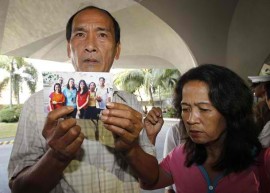
Family of one of the three Filipino drug mules, Sally Ordinario Villanueva who were executed in China last March 30 met for the first time Tita Cacayan, the said to be recruiter of Sally at the Department of Justice (DOJ).
The preliminary investigation for the Case of Tita Cacayan against the complaint of large scale illegal recruitment and violation of trafficking in Person Act of 2008 started last Monday where in she submitted her counter affidavit.
In the affidavit submitted by Sally, she said that Tita Cacayan was her recruiter and the one who offered her a job in Xiamen. She alleged that Cacayan was the source of the drugs she carried to China and provided her with an empty suitcase to use were in she is not aware that it contains illegal drugs of more than 4,000 grams.
In front of Tita Cacayan, Sally’s brother Jason Ordinario read a handwritten letter that was sent by Sally to the Philippine Consulate in China, were in she said that her “auntie” Tita Cacayan was the one who gave her the briefcase which contains illegal drugs.
In the preliminary investigation last Monday, the letter of Sally was read and she was blaming Tita Cacayan for what happened to her and that she did everything Cacayan asked her to do for her family to have a better life but then Tita Cacayan has been unfair to her. “My purpose is so [that] my family will get a better life by doing some work for a friend. I don’t have any choice…that was unfair to me,” Sally said in her letter.
However, Cacayan strongly denied the allegation and said that the letter was fake.
She said that the letter was not even registered and added that they must not put all the blame on her. (–foul word(s) removed–)istance prosecutor Lilian Doris Alejo interfere on the conflict between the two parties and said that it would be better if the letter could be attached to the reply that Villanueva’s family will submit on April 25 which is the date for the next preliminary investigation that can be presented during the clarificatory hearing.
Alejo advise the two parties not to be combative and these should be better addressed during the calrificatory hearing.
